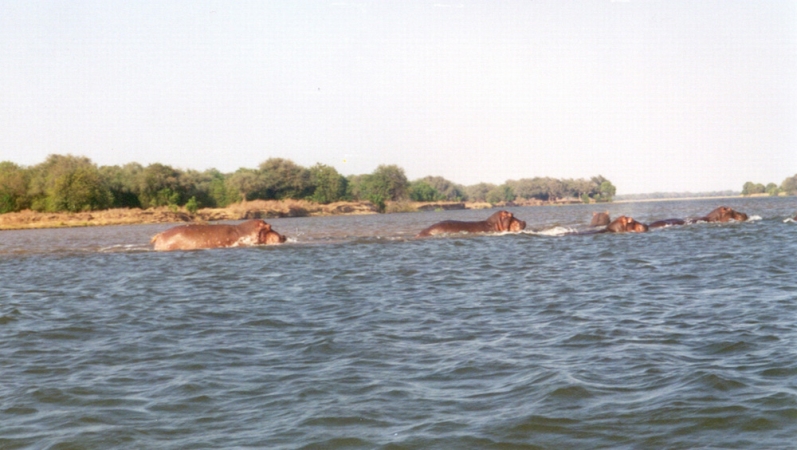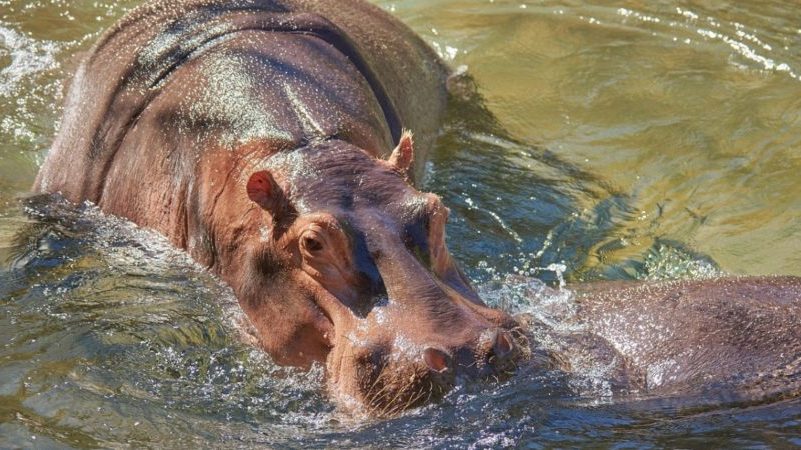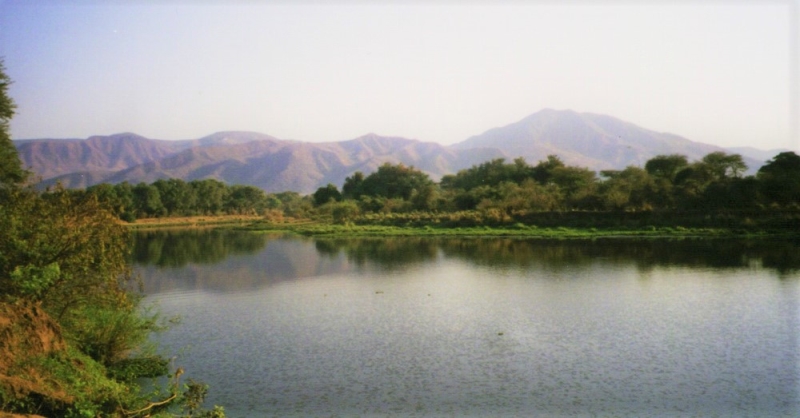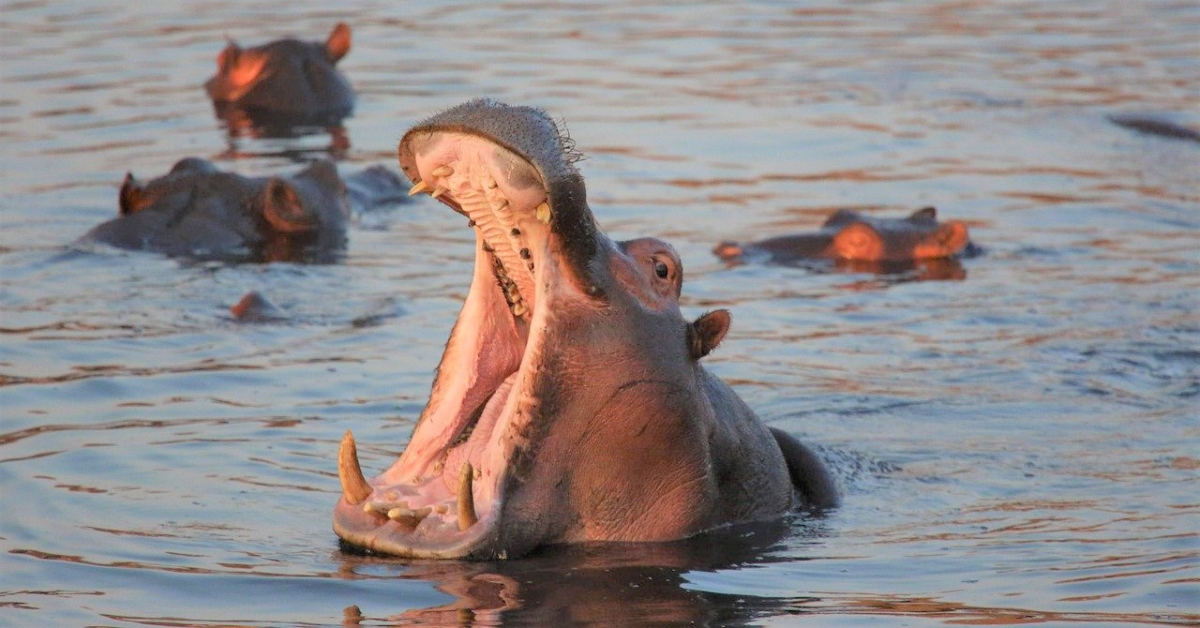Photo: RoyBuri via Pixabay
It is one of the most impressive animals on earth: the hippopotamus or hippo for short. They are the third-largest land animal, with elephants in the number one spot, and the rhinoceros a close second.
As a vegan, I avoid going to the zoo: it is a pathetic sight to see these majestic animals in a silly bathtub. Luckily, you can still get up-close a personal with a hippo without going to the zoo. OK, you have to travel to Africa. But it is well worth the effort. I have seen them up-close, closer than I would have liked, and it was an amazing experience. I will tell you here to see hippos in the wild, in their own habitat.
Things you might not know about hippos
The hippo (the name is actually derived from the Greek for 'river horse') looks adorable and even cuddly. Don't be fooled by its jolly appearance. The hippo is the most dangerous animal on the planet and is responsible for more human fatalities than any other animal. Don't worry too much about lions or hyenas or even crocodiles, when on safari, it's the hippos you have to look out for.
The danger is in their size, the huge tusks, their aggressiveness, and unpredictability. Hippos are also extremely territorial, especially when they have young calves. Adult males can weigh up to 1,500 kg (3,310 lbs) and can reach speeds of up to 30 km/h (19 mph) on land. Try running away from that!
“A hippo will rise to the surface on auto-pilot. Even when it is sleeping it will come up for air, without waking up.”
They spend most of their time in the water where they cool down and will only emerge from the water at dusk to graze on grasses, their main source of nutrition (yes, hippos are vegan!). On land, hippos are not territorial and far less dangerous than in the water. Here, they graze alone. So your chances are much better than when you are confronted by an entire herd in the water.
Hippos are stealthy!
Hippos live in rivers and swamps in Sub-Saharan countries, so there are plenty of places to choose from. I did my little hippo expedition in the Zambezi River, which is actually the border between Zambia and Zimbabwe. The Zambezi River is one of the largest rivers in Africa and has an abundance of hippos.
To get close to these impressive animals you have to get onto the water. You could choose to go out in a motorized boat, but that will only disturb the animals. By far the best way is to hire a canoe. I took a canoe trip in a section of the Lower Zambezi National Park where the river is wide (up to 400 m or 1,200 ft) and slow-moving.
Are you wondering where to see hippos?
My first encounter with a hippo happened during a canoeing trip a while ago with a company called Drifters while I was on a tour in Zimbabwe. We were paddling out on the great Zambezi river and I was nervously anticipating my first hippo spotting. When all of a sudden, an entire hippo family surfaced just meters away from my canoe. I completely froze and almost crapped my pants. They are so huge, you can hardly imagine. You only realize this when they are this close. When they start opening their mouths and roar at you (it's actually called yawning), you realize you are truly out of your element there on that river. The yawning is used as a threat display to scare off predators, which works pretty well!
“If a hippo comes up for air, be somewhere else!”
- A very wise person in Zimbabwe
In the water Hippos typically move at speeds of up to 8 km/h (5 mph), which is a lot faster than most can paddle. Surprisingly hippos can't swim. They move by simply running on the river bed, or by submerging themselves and pushing off the river bed.
Our guide told us there are way more hippos than you can actually see. They stay submerged most of the time and only come up for air every 5 minutes. They are very stealthy animals. It makes canoeing pretty hazardous if you don’t know where it will be emerging. There is one little trick though: if you hit your canoe with your peddle they come up to see what is going on. You can imagine I spent most of my 2-day canoeing trip hitting my canoe, rather than actually propelling it. All in all my first encounter was a very humbling experience.
Photo: mlproject via Pixabay
Spending the night with hippos (and other scary things)
During my canoeing trip, we stayed one night in the Zimbabwean wilderness. We brought some tents ( it was a very low-budget trip) which we put up just before dusk. We were camping on the shore of a small island in the river, to reduce our chances of having to encounter poisonous spiders and snakes as well as angry hippos.
I didn't sight any hippos before I went to sleep, nor did I hear them during the night. But they were DEFINITELY there! When I woke up all of the tents were surrounded by huge hippo footprints. They had either been very curious, or we had accidentally chosen their favorite grassy spot to put up our tents.
Some tips and tricks for canoeing with hippos
A canoeing trip on a hippo-infested river is a great adventure. To make sure you live to tell the story to your friends & family, here are some tips and tricks:
- Make sure you know how to use a canoe, or have someone in your canoe who does;
- Bring a professional guide who can tell you where to go, and which places to avoid;
- Hit your canoe with your paddle every so often to invite the hippos to emerge;
- Don't get out of the canoe if you don't really have to, the hippo habitat is also infested with crocodiles;
- Stay away from hippos, don't be tempted to go for the selfie, it will cost you dearly;
- Choose a stretch of river that is slow-flowing, so you will have all your energy to navigate the hippos, not the current;
- Keep in mind, ALL THE TIME, that they can capsize your boat and kill you if you get too close. Show immense respect for these great animals and KEEP YOUR DISTANCE.
It was an amazing way to see these animals in the wild, without being a disturbance to them or harming them.

“No animals were being harmed by making this canoeing trip”
- Stefan
More interesting animals
If you like to read more about interesting and exciting animals, have a look at these articles:




